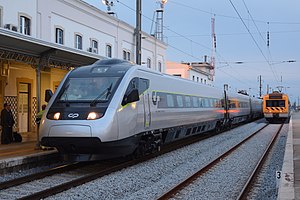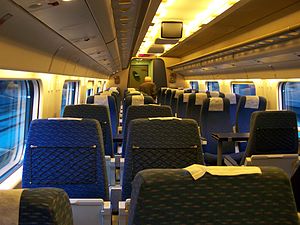Alfa Pendular
| Alfa Pendular | |
|---|---|
 An Alfa Pendular train in new livery. | |
 The old interior of a second class carriage. | |
| Manufacturer | FIAT Ferroviaria, ADtranz, Siemens |
| Built at | Sorefame, Amadora |
| Family name | Pendolino |
| Entered service | 1999 |
| Refurbished | 2017 |
| Number built | 10 six-carriage units |
| Number in service | 9 |
| Number scrapped | 1 |
| Fleet numbers | Série 4000 (numbers 4001-4010 and 4051-4060) |
| Capacity | 301 seats |
| Operator(s) | CP |
| Line(s) served | Braga-Porto-Lisbon-Faro |
| Specifications | |
| Train length | 158.9 m (521 ft) |
| Width | 2.92 m (9 ft 7 in) |
| Height | 4.39 m (14 ft 5 in) |
| Maximum speed | 220 km/h (140 mph) |
| Weight | 298.3 t (293.6 long tons; 328.8 short tons) |
| Axle load | 14.3 t (14.1 long tons; 15.8 short tons) |
| Traction system | 8 asynchronous three-phase Siemens 1TB2223-OGA03 motors |
| Power output | 4,000 kW (5,400 hp) |
| UIC classification | (1A)(A1) – (1A)(A1) – 2′2′ + 2′2′ – (1A)(A1) – (1A)(A1) |
| Track gauge | 1,668 mm (5 ft 5+21⁄32 in) Iberian gauge |
Alfa Pendular | ||||||||||||||||||||||||||||||||||||||||||||||||||||||||||||||||||||||||||||||||||||||||||||||||||||||||||||||||||||||||||||||||||||||||||||||||||||||||||||||||||||||||||||||||||||||||||||||||||||
|---|---|---|---|---|---|---|---|---|---|---|---|---|---|---|---|---|---|---|---|---|---|---|---|---|---|---|---|---|---|---|---|---|---|---|---|---|---|---|---|---|---|---|---|---|---|---|---|---|---|---|---|---|---|---|---|---|---|---|---|---|---|---|---|---|---|---|---|---|---|---|---|---|---|---|---|---|---|---|---|---|---|---|---|---|---|---|---|---|---|---|---|---|---|---|---|---|---|---|---|---|---|---|---|---|---|---|---|---|---|---|---|---|---|---|---|---|---|---|---|---|---|---|---|---|---|---|---|---|---|---|---|---|---|---|---|---|---|---|---|---|---|---|---|---|---|---|---|---|---|---|---|---|---|---|---|---|---|---|---|---|---|---|---|---|---|---|---|---|---|---|---|---|---|---|---|---|---|---|---|---|---|---|---|---|---|---|---|---|---|---|---|---|---|---|---|---|
| ||||||||||||||||||||||||||||||||||||||||||||||||||||||||||||||||||||||||||||||||||||||||||||||||||||||||||||||||||||||||||||||||||||||||||||||||||||||||||||||||||||||||||||||||||||||||||||||||||||
Alfa Pendular is the name of the Pendolino high-speed tilting train of Portuguese state railway company CP.[1] It connects the cities of Guimarães, Braga, Porto, Aveiro, Coimbra, Santarém, Lisbon, Albufeira and Faro, among others at speeds of up to 220 kilometres per hour (137 mph).
The trains were assembled in Portugal by ADtranz at the former Sorefame works at Amadora, based on contracting partnership between Fiat-Ferroviaria as the main contractor and ADtranz and Siemens as the main subcontractors.
Beginning 2017, the trains were refurbished, introducing new interiors, livery, seating and features such as Wi-Fi and power outlets.[2]
Description[]
The Alfa Pendular high speed train is a six car electric multiple unit (EMU), which is derived from and closely resembles the Giugiaro designed Italian Fiat-Ferroviaria ETR 480 Pendolino train. The bogies had to be redesigned to operate on Portugal's 1,668 mm (5 ft 5+21⁄32 in) Iberian gauge track.
There are 8 traction motors, installed on all but the two middle vehicles of the train, developing 4.0 megawatts (5,400 hp). This M-M-T-T-M-M arrangement spreads the weight of the train, giving it a weight of only 13.5 tonnes (13.3 long tons; 14.9 short tons) per axle, which helps its cornering ability at high speed.
During testing, a top speed of 245.6 km/h (152.6 mph) was reached close to Espinho in 1998.
Tilting technology[]
Its tilting train technology, with a maximum tilt angle of 8°, allows the train to negotiate curves at higher speeds than conventional trains. The combination of the resulting high cornering velocity and the tilting movement of the carriages helps ensure a comfortable ride for the passengers, although the jostle and sway compensating for track irregularities may cause "travel sickness" in those susceptible. The hydraulic tilting system is governed by two gyroscopes in the head cars. The curve is found on the base of the elevation of the external track.
The use of this train did not require particular modifications to the existing rail network, but it is expensive in terms of maintenance of the rolling stock because of the complexity of the tilting system.
Stations[]
The stations served by the Alfa Pendular are from north to south:[3]
- Braga
- Guimarães
- Famalicão
- Trofa
- Porto-Campanhã
- Vila Nova de Gaia
- Espinho
- Aveiro
- Coimbra-B
- Pombal
- Entroncamento
- Santarém
- Lisboa-Oriente
- Lisboa-Santa Apolónia (off the lines from/to Faro)
- Lisboa-Entrecampos
- Pinhal Novo
- Tunes
- Albufeira
- Loulé
- Faro

See also[]
- List of high speed trains
References[]
- ^ Série 4000: CP official website
- ^ Portugal, Comboios de. "#NovoAlfaPendular". CP.PT | Comboios de Portugal. Retrieved 2019-09-23.
- ^ Comboios de Portugal > Alfa Pendular > Estações
External links[]
![]() Media related to Alfa Pendular at Wikimedia Commons
Media related to Alfa Pendular at Wikimedia Commons
- Pendolino
- Tilting trains
- High-speed rail in Portugal
- Electric multiple units of Portugal
- Fiat Ferroviaria